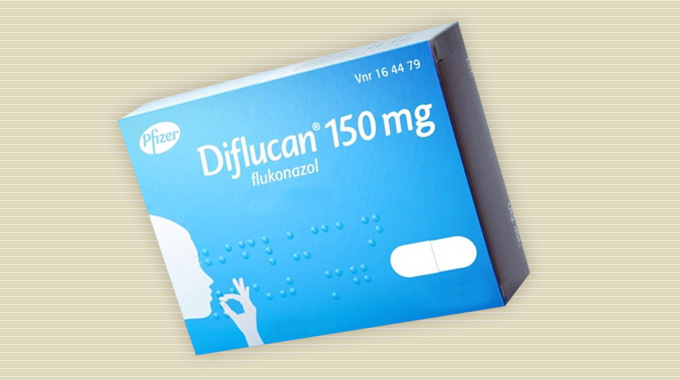Diflucan (fluconazole)
Diflucan is the brand name for Fluconazole. It is an antifungal medicine. Fluconazole is the first of its name to be present as a new subclass of the synthetic tri-azole anti-fungal agents. Fluconazole is a white colour crystalline solid which is mildly soluble in water

Dosage
The dosage of Diflucan (containing fluconazole) can vary depending on the specific fungal infection being treated, the severity of the infection, and individual factors. It is important to follow your healthcare provider's instructions or the directions on the prescription label. The typical dosage recommendations for Diflucan are as follows:
For adults:
- Vaginal yeast infections: A single oral dose of 150 mg is usually sufficient.
- Oropharyngeal and esophageal candidiasis: The recommended dosage is 200 mg on the first day, followed by 100 to 200 mg once daily for 7 to 14 days.
- Systemic fungal infections: The dosage can range from 200 to 800 mg daily, depending on the type and severity of the infection.
For children:
- The dosage for children will depend on their age, weight, and the specific fungal infection being treated. It is determined by the healthcare provider and should be followed carefully.
For prevention of fungal infections in certain patients, such as those with weakened immune systems, the dosage may be different and should be determined by the healthcare provider.
Mechanism of action (MOA)
Fluconazole impedes the enzyme 14 alpha –demethylase produce by the fungal cytochrome P450. This hinderance prevents the lanosterol conversion to ergosterol and subsequent collection of 14 alpha- methyl sterols. It is also a fungicidal agent mostly for cryptococcus.
Uses
- Vaginal yeast infections
- Cryptococcal meningitis
- Esophageal candidiasis
- Oral fungal infection
- Urinary tract infection
- Pneumonia
- Disseminated infections
- Peritonitis
Also it helps in treating the infections after chemotherapy and radiation for the bone marrow transplantation and also in AIDS.
Dosage and Administration
The dosage for fluconazole is 150 miligram orally single dose.
- For multiple dosage
- For oropharyngeal candidiasis
- The recommended dose is 250mg started on the first day followed by 100mg once everyday
- For esophageal candidiasis
- The dose recommended is 200mg followed by 100mg daily. The dose can go up-to 400mg maximum
- For systemic candidiasis
Information for the use of Diflucan tablets 50 mg and 100 mg, powder for oral suspension 50 mg/5 ml, injection 100 ml vial.
Doses up-to 400mg can be used.
For cryptococcal meningitis
The recommended dosage is 400mg followed by 200mg once everyday. The doses are medically monitored by doctor.
Intitial therapy for Diflucan can be continued till 10-12 weeks and then only it should be stopped.

Side-Effects
Common side-effects are
- Headache
- Nausea
- Abdominal pain
- Diarrhoea
- Dyspepsia
- Rash
- Jaundice
- Hepatitis
- Angioedema
- Fever
- Malaise
- Asthenia
- Fatigue
- Leucopenia
- Thrombocytopenia
- Hypokalemia
- Cholestasis
- Dry mouth
- Hepatocellular damage
- Myalgia
- Insomnia
- Tremor
- Vertigo
- Stevens-johnson-syndrome
- Alopecia
Precautions and Warnings
In cases of Liver Dysfunction Fluconazole should be administered with extreme caution as it may cause hepatic toxicity.
Fluconazole should be taken with caution as it has been reported that it causes prolonged QT interval. Q-T interval from the ECG. Also there is risk of cardio toxicity if fluconazole and erythromycin are ever combined.
Please be caution when driving a vehicle as it causes dizzy spells sometimes after taking Fluconazole.
Pregnancy and Breast-Feeding
Reports have been suggested that taking this drug while pregnant or trying to get pregnant is harmful as it will cause miscarriage in a pregnant women. Please consult your doctor for an alternative drug if you are suffering from vulvovaginal yeast infections. You can use topical antifungals during that time as they are mild compared to others.
Also it enters the breast milk so please take caution while using it.
Drug Interaction
Drugs like phenytoin, rifampin, cisapride, oral hypoglycemics, oral contraceptives, rifabutin, tacrolimus , cyclosporine ,short acting benzodiazepines , theophylline , amphotericin B, losartan and prednisolone etc are some of the drugs that while combined with Fluconazole can change the course of action of the drug. Please let your doctor know about the drugs you use before taking them.

Fungi is the most wide spread species of plantae kingdom on earth. It habitats ranger from hundreds of degrees of temperature to the most dehydrated conditions. Due to its versatility and successful survival, the fungi also infect and damage human bodies. Diseases of various organs are invaded by a variety of fungi. Consequently, research has lead to the development of anti-fungi drugs and Diflucan is one of them.
Infections of both, superficial and deep nature are treated by Diflucan effectively. The drug chiefly is a fungi-static i.e. it halts the growth of fungi. The drug acts to inhibit the activity of demethylase enzyme significantly. Fungal demethylase enzyme is responsible for the accommodation of lanosterol and ergosterol in their cellular membranes to complete its structure. When inhibit, the membrane formed is defected and the fungus is prevented from thriving in the human body.
Diflucan is an important treatment-resistant drug that is to be given when all the fungicides have failed to cut fungal growth at the infection site. Candida albicans is a special kind of yeast that infects human organs like skin armpits, mouth, groin, folds of buttocks and also the genital organs in both the sexes. Candidasis can be superficial or of systemic form in more severe cases. Diflucan provides an effective treatment for candidasis and reduced the infection significantly.
Vaginal yeast infection is most susceptible when taking oral pills, irritation by vaginal douches, pregnancy tensions and vaginal sex immediately after anal sex. 75% of the women suffer from yeast infection at some stage of their life.
Patients with chronic fungal or yeast infection are readily curable by the drug. Diflucan is toxic if taken for too long but is counted among its family with less toxicity. Another positive aspect of diflucan over other anti-fungi drug is that it is absorbed systemically in an effective way.
The natural acidity of stomach does not interfere with the absorption of the drug and its subsequent appearance in urine, tears and skin. This is on of the characters that make the drug perfect for the treatment of vaginal infections and skin infections. Orally taken, Diflucan is prescribed with a dosage of 150mg tablets daily for genital infections, 500-600 mg daily for systemic infections and 150-300 mg weekly for skin infections. For immediate treatment of adverse meningitis 800mg potency is advised to be taken daily.
The side effects of the drug include cardiac arrhythmias and toxicity of liver. It appears in the breast milk readily thus unadvisable for lactating women. People showing allergic responses to other azole drugs should also not resort to such drug. Liability to anaphylaxis may also be increased. Adverse drug reactions may include anorexia, fatigue, headache, nausea, diarrhea, constipation, and hepatic failure and torsades de pointes in the rarest conditions.
If you have been using anti-fungal drugs and the infection still persists, Diflucan is potent enough to actively remove even the adverse sort of yeast infections. Diflucan can now be readily availed from our online pharmacy. Our online facilities ensure for our visitors original quality medicine to be availed conveniently in the most affordable way.
Some frequently asked questions about Fluconazole
What is fluconazole?
Fluconazole is an antifungal medication commonly prescribed to treat fungal infections caused by various types of fungi. It belongs to the azole class of antifungals.
What conditions can fluconazole treat?
Fluconazole is effective in treating a range of fungal infections, including vaginal yeast infections (candidiasis), oral and esophageal thrush, systemic candidiasis, cryptococcal meningitis, and certain types of skin and nail fungal infections.
How does fluconazole work?
Fluconazole works by inhibiting the synthesis of ergosterol, a vital component of fungal cell membranes. By disrupting the integrity of the fungal cell membrane, fluconazole effectively kills or prevents the growth of the fungi causing the infection.
Is fluconazole effective against all types of fungal infections?
While fluconazole is effective against many types of fungal infections, it may not be suitable for all cases. Some fungal infections, such as those caused by certain molds or resistant strains of fungi, may require alternative antifungal medications. It is important to consult with your healthcare provider for an accurate diagnosis and appropriate treatment.
How is fluconazole taken?
Fluconazole is available in various forms, including oral tablets, oral suspension, and intravenous (IV) injection. The specific dosage and duration of treatment will depend on the type and severity of the fungal infection. Always follow your healthcare provider's instructions or the directions on the prescription label.
Can fluconazole interact with other medications?
Fluconazole can interact with certain medications, including blood thinners (anticoagulants), some anticonvulsants, certain antifungal drugs, and certain medications metabolized by the liver. It is important to inform your healthcare provider about all the medications, supplements, or herbal products you are taking to avoid potential interactions.
Are there any side effects associated with fluconazole?
Common side effects of fluconazole may include nausea, vomiting, diarrhea, headache, abdominal pain, and skin rash. In rare cases, severe allergic reactions or liver problems may occur. If you experience any concerning or persistent side effects, contact your healthcare provider.
Can fluconazole be used during pregnancy or while breastfeeding?
The use of fluconazole during pregnancy or while breastfeeding should be discussed with a healthcare provider. In some situations, it may be deemed safe, but the potential risks and benefits should be evaluated based on individual circumstances.
Can fluconazole be taken with food?
Fluconazole can be taken with or without food. However, taking it with food may help reduce stomach upset.
Can I drink alcohol while taking fluconazole?
It is generally recommended to avoid alcohol while taking fluconazole. Alcohol consumption may increase the risk of certain side effects and may interfere with the effectiveness of the medication. It is best to consult your healthcare provider for specific guidance on alcohol use during fluconazole treatment.
Brand names in France
Beagyne, Triflucan.
Brand names in Spain
Citiges, Lavisa, Loitin, Nesporac, Solacap.
Brand names in Italy
Biozolene, Elazor, Flumicon, Lefunzol, Riflax, Winch.
Brand names in Australia
Dizole, Fluzole, Ozole.
Brand names in Mexico
Afungil, Bioxel, Candizol, Difusel, Fectrin, Fharder, Fleridux, Flucoxan, Fludisol, Fluhexal, Flukenol, Flukezol, Fluxes, Fluxicap, Fluzor, Funser, Lanfluzol, Menifar, Neofomiral, Ongicil, Oxifungol, Ranflu, Solarisol, Terplex, Waynazol, Zilrin, Zoldicam, Zonal.



